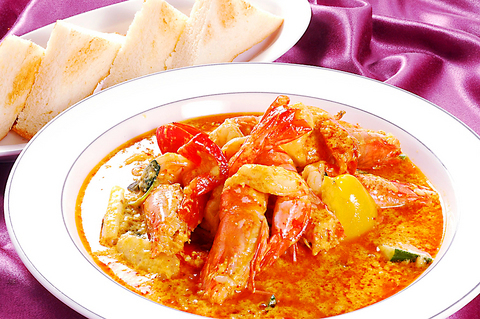It's hard to find anything bad to say about Home's, a stylishly decorated Thai restaurant located directly across from Breeze Center Mall ( "The service is great, the food is great and the portions are good," said Sohail Roshan, a regular customer. Home's quality is further underlined by the fact that it joined an elite group of Thai restaurants last month when it won the Thai Select certificate, a program the Thai government initiated two years ago to promote the country's cuisine abroad. Home's was one of three Taiwanese restaurants to earn this distinction and the only one that is locally owned. "We mix traditional Thai cuisine with modern elements," said owner and manager David Huang (黃正發), who was born in Myanmar and lived in Chiangmai, northern Thailand as a teenager. He chose the name Home's to evoke the image of a place where customers can feel comfortable. PHOTO COURTESY OF HOME'S THAI CUISINE Huang recommends the Thai sauce raw shrimp, the Thai grilled lamb steak and the royal Thai curry prawns. "The Thai sauce raw shrimp really represents Thai cuisine," he said. It consists of eight pealed sashimi shrimp topped with fresh-squeezed lemon juice, diced garlic, fish sauce and grated hot peppers. Each of these elements can be tasted on the first bite, as they burst onto the palette in a cascade of flavors. The lamb steak is marinated for two days before being cut into medallions and served on the bone with a house special red sauce. The flavor is more subtle and the meat is well marbled and of good quality. The curry prawns are Home's house specialty. Served on a bed of red bell peppers with a side of sliced bread, the sauce is made from a mixture of Indian and Thai curries. Chopped peanuts give a contrasting texture to the mildly spicy curry, which has the consistency of melted butter. Wash these down with a glass of Singha beer or Thai tea, a pinkish-orange milk tea with a hint of coffee. The tea goes down smooth and doesn't leave a bitter or sugary aftertaste. With the notable exception of the bread served with the curry prawns, which was a bit sweet, everything else sampled for this review tasted authentic and delicious, which might be because every chef at Home's was hired directly from Thailand.
Thai cuisine found a home in Taipei.

That US assistance was a model for Taiwan’s spectacular development success was early recognized by policymakers and analysts. In a report to the US Congress for the fiscal year 1962, former President John F. Kennedy noted Taiwan’s “rapid economic growth,” was “producing a substantial net gain in living.” Kennedy had a stake in Taiwan’s achievements and the US’ official development assistance (ODA) in general: In September 1961, his entreaty to make the 1960s a “decade of development,” and an accompanying proposal for dedicated legislation to this end, had been formalized by congressional passage of the Foreign Assistance Act. Two

Despite the intense sunshine, we were hardly breaking a sweat as we cruised along the flat, dedicated bike lane, well protected from the heat by a canopy of trees. The electric assist on the bikes likely made a difference, too. Far removed from the bustle and noise of the Taichung traffic, we admired the serene rural scenery, making our way over rivers, alongside rice paddies and through pear orchards. Our route for the day covered two bike paths that connect in Fengyuan District (豐原) and are best done together. The Hou-Feng Bike Path (后豐鐵馬道) runs southward from Houli District (后里) while the

The Taipei Times last week reported that the Control Yuan said it had been “left with no choice” but to ask the Constitutional Court to rule on the constitutionality of the central government budget, which left it without a budget. Lost in the outrage over the cuts to defense and to the Constitutional Court were the cuts to the Control Yuan, whose operating budget was slashed by 96 percent. It is unable even to pay its utility bills, and in the press conference it convened on the issue, said that its department directors were paying out of pocket for gasoline

On March 13 President William Lai (賴清德) gave a national security speech noting the 20th year since the passing of China’s Anti-Secession Law (反分裂國家法) in March 2005 that laid the legal groundwork for an invasion of Taiwan. That law, and other subsequent ones, are merely political theater created by the Chinese Communist Party (CCP) to have something to point to so they can claim “we have to do it, it is the law.” The president’s speech was somber and said: “By its actions, China already satisfies the definition of a ‘foreign hostile force’ as provided in the Anti-Infiltration Act, which unlike